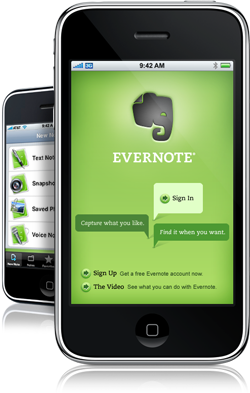Thing 9 is all about an online tool called Evernote which allows you in the words of the site developers to "remember everything - capture anything, access anywhere, find things first".
I'm new to this tool and at this stage not sure whether I'll use it regularly, but am sure it has its uses - it sells itself as allowing you the ability to take notes on webpages and archive from future consultation and the ability to organise, annotate and tag sorted notes. I kind of advanced Delicious (which allows you tag and share bookmarks).
Advantages and disadvantages of Evernote
From my own point of view I'm often sending email pointers to friends and colleagues which I sometimes want to refer back to myself. This can be annoying because typically I'll have forgotten the original weblink and need to remember where I located it online. Also, since I work across several PCs, I have online bookmark links left, right and centre - so Evernote might be helpful here.
For this reason, I've downloaded Evernote onto my home PC. At first glance I don't find the main screen particularly helpful in terms of layout but maybe that's because I'm not using the application in 'real anger' so to speak. However, other existing users of Evernote seem to praise it highly - see:
- Evernote review - 10 reasons why you should download and try Evernote (My Digital Internet blog)
- Evernote review - Online note taking Software PC and mobile (Monitize your time blog)
The downsides for Evernote are that I cannot download onto my work PC due to system restrictions, although I could work round and use the online access which is beneficial.
The Cloud
Evernote is just one example of an application on 'The Cloud' where you can store, share, communicate and run your life online. Of course, using tools like Twitter, Facebook, online photo sharing websites and blogging are other examples.
(PS: If you don't know what I'm talking about, there is a great overview of cloud computing including an overview of how it works, the benefits and how to use if for business purposes which can be found in the guidance on cloud computing on the Businesslink website)
In an ideal world cloud computing means no more pesky PCs which run the risk of hard disk failures and crashes but instead promises an integrated, organised, productive way of working from anytime, anyplace, anywhere - pure heaven!
However, cloud computing is not without its problems - the big bug bear being security concerns but also usability, standardisation and connectivity issues. See a BBC news article about cloud computing for business goes mainstream which highlights some of these concerns further.
Back in October 2010, the team at Channel 5's The Gadget Show featured one of their head-to-head presenter competitions to demonstrate the pros and cons of cloud vs non-cloud computing (View the feature at: http://fwd.five.tv/gadget-show/blog/episode-10-cloud-computing). This was designed to look at looking at which performed better across a range of tasks. The competition showed that the cloud was less helpful if editing a movie or sharing large amounts of data but more useful when sharing information or recovering lost data. Brilliant stuff which was presented in an entertaining way and gave food for thought about the possibilities and limitations of cloud computing for people generally.
The trend seems to be for increasing moves to intangible computing in the ether.
Before too long I wouldn't be surprised if loads more tools and apps start to replace Evernote and other services (indeed I've seen talk online that Delicious might be sold off and I've recently had experience of a book sharing website closing which caused me lots of frustration to transfer my 500+ list of books to a new site).
One interesting example of the trend towards 'cloud computing' is looking at the history of IBM which is now 100 years old. IBM shows where computers came from and where computing is going into the future. IBM have a museum at their Hursley research centre site in the US which includes the first portable computer - the IBM 5100. Nowadays, however IBM is focused on software and development and into the future, the museum will have to get more creative about demonstrating the intangible nature of IBM's modern development as a company. (To find out more see IBM at 100: From typewriters to the cloud including a video of how far we've come in technology terms)
The future definitely seems to be about more mobile devices, apps and tools like Evernote and working online from everyone. More reasons for me to keep up to date, get a smart phone and keep up with the trends. What this will do for my work-life balance I dread to think, but at least I'll be taking steps to become less fuzzy round the edges and more organised.



1 comment:
Some useful links there - thanks!
Post a Comment